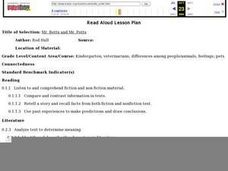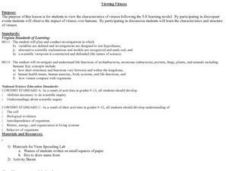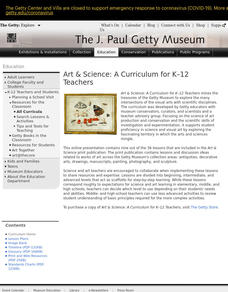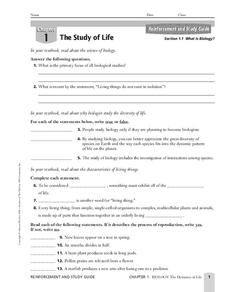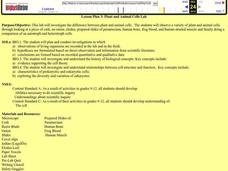Curated OER
Continent of Africa
In this geography worksheet, students examine a map of Africa and read about the characteristics of the continent. They use the map and information to answer 10 online fill in the blank questions.
Curated OER
Cows, Worms and Compost
Third graders explore agriculture by viewing a PowerPoint presentation in class. In this animal relationship lesson, 3rd graders identify the types of farm animals humans feed on and their dependency on such small insects like worms....
Curated OER
Species Diversity in Ecosystems with Different Techniques of Land Management
Young scholars visit numerous places to help in their understanding of Ecology. In this biology lesson plan, students will learn about characteristics and how to identify numerous plants and animals. This lesson allows for many field...
Curated OER
"Mr. Betts and Mr. Potts"
First graders listen to the book "Mr. Betts and Mr. Potts" and examine the career of being a veterinarian. They categorize animals based on whether they could be house pets or not, develop a class pet graph, and list the various...
Curated OER
Creatures of the Ocean
Second graders examine the characteristics of a specific ocean creature. In pairs, 2nd graders create a graphic organizer to list categories and supporting details of the ocean creature. Students review data and use it to write a report...
Curated OER
Music: Sounds on the Farm
Singing is a great way to build memory, music, and verbal communication skills. Little ones sing the song, "Old Mac Donald had a Farm." They make the sounds of each animal on the farm paying attention to signaling cues, singing high, and...
Curated OER
What is an Animal?
For this animal classification worksheet, students will review the characteristics used in classifying animals including the development of animals. Students will compare the endoderm, ectoderm, and mesoderm. This worksheet has 4 short...
Curated OER
Arthropods at Home- Spider, Isopod, or Any Arthropod
Students design a habitat for an arthropod. In this organisms lesson, students read the book, A House is a House For Me. Students find an arthropod and create a terrarium.
Curated OER
Now Hear This!
Students observe the differences between low- and high-frequency sounds. They research and compare the characteristics of various animals that rely on infrasonic sounds to communicate.
Curated OER
Life in Sahara
Students explore the geography of the Sahara region of Africa and identify characteristics of a desert habitat. They explore the culture of the people living there and how it has adapted to desert life.
Curated OER
Everything in Its Place: Science Classification
Students investigate the system of classification for living things through the sixteen lessons of this unit. The five kingdoms of monerans, protists, fungi, plants, and animals form the basis of several experiments as the similarities...
Curated OER
Viewing Viruses
Students view the characteristics of viruses following the 5-E learning model. By participating in discrepant events Students observe the impact of viruses over humans. By participating in discussion students examine the characteristics...
Curated OER
Clearly Classified
Learners investigate plants and insects. In this science classification lesson, students create separate categories for insects and plants by characteristics. Learners discover scientific names of insects.
Curated OER
Monterey Bay Aquarium: One-Two-Three
In this counting worksheet, students examine pictures of animals that live in the Monterey Bay Aquarium. They describe the animals by telling how many of a specified characteristic they have. Example: A sea otter has one tail.
Curated OER
Life at Risk
Learners examine the characteristics of the peregrine falcon. They investigate endangered and extinct species, and how the environment affects the process.
Curated OER
Spot Identification of Some of the Most Common Insect Orders
Students investigate the basic characteristics of insect orders and develop short-cut techniques to identify insects into twelve of the most common orders. They use captured specimens and photographs to practice identification and then...
Curated OER
Save the _____ Story Board
Pupils research an endangered species. They examine statistics, characteristics, and information about the species. Students play "webmaster" and design a site that will help to save an endangered species.
Curated OER
Mollusks
In this mollusks learning exercise, students will review the characteristics of the three major classes of mollusks: gastropods, bivalves, and cephalopods. This learning exercise has 17 matching, 6 short answer, 9 fill in the blank, and...
Curated OER
What is Biology?
In this science of biology worksheet, students will review the concepts relating to biology including the characteristics of living things, the process of reproduction, adaptations, and evolution. This worksheet has 5 short answer, 3...
Curated OER
Plant and Animal Cells
Students investigate the difference between plant and animal cells. They observe a variety o plant and animals cells by looking at a piece of cork, an onion, elodea, prepared slides of paramecium, human bone, frog blood, and human...
Curated OER
Mammals
Students examine the characteristics of mammals through video clips, and slide shows. Lesson includes clips of fastest land animal, biggest mammal, loudest mammal and tallest animal.
Curated OER
Brain POP - Dinosaur
In this earth science worksheet, students complete a sheet by filling-in each blank with the correct response. They identify various types of dinosaurs and what they ate. Students also identify their various characteristics.
Curated OER
What Makes Up Rocks and Soils?
In this rocks and soils instructional activity, students will complete a Venn diagram comparing the specific characteristics of rocks and soils.
Curated OER
Fishes
In this fish worksheet, students will review the characteristics of fish by comparing the jaws, skeleton, and fertilization of each fish class. Then students will use a phylogenetic tree to compare the groups of fish to ancestral...





